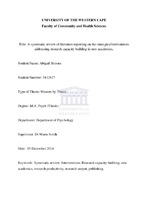A systematic review of literature reporting on the strategies/interventions addressing research capacity building in new academics
Abstract
It is often assumed that postgraduate students and neophyte academics have the capacity to conduct research independently. Thus, upon qualification, it is expected of postgraduate students and academics to conduct research independently, publish their findings, meet publication targets and to supervise student research towards completion. However, the transition from postgraduate student or clinician to academia is considered very challenging as they are often not prepared for the multiple changes they will embark on upon entry into the Higher Education sector. As a result, various programmes and frameworks have been introduced to assist new academics in enhancing their research capacity. Such strategies included but were not limited to, writing retreats, peer monitoring, and dedicated time. However, these interventions reported on in literature are from primary sources and fail to comment on either the methodological rigour or the quality of the studies investigating these interventions. Thus there exists a gap in the literature for filtered information that has been systematically evaluated for methodological rigour and coherence. The present study aimed to establish an empirical base (filtered evidence) of literature reporting on strategies or interventions aimed at addressing research productivity in new academics. The study incorporated a systematic review methodology to identify appropriate literature for inclusion, evaluate literature for methodological quality and provide a meta-synthesis of the findings of included studies. The review considered studies, reporting on strategies or interventions with new academics during the period of 2000-2013. The review was conducted along three levels. Firstly, identification of potential titles, whereby keywords were combined and a comprehensive search of databases available at the University of the Western Cape library was initiated. Published research was also retrieved through mining the reference list of all included reports and articles. Secondly, a pair of reviewers worked together by screening the abstracts which were retrieved based on the titles identified, and thirdly, the abstracts that were successfully screened moved forward to full text reading. These studies were evaluated for methodological quality using the critical appraisal tool. Eligibility for inclusion was determined by a threshold score of 61%. As a result, the title search yielded a search result of 755, from these only 63 titles were selected for possible inclusion. The abstract screening resulted in the exclusion of 35 articles and 28 were included. After the critical appraisal, 15 articles were excluded. The findings of the present study revealed that there is good quality research on research capacity building for neophyte academics, as assessed on methodological rigour and coherence. Seven articles attained the threshold score (61% and above) for inclusion in the final summation and meta-synthesis. Evidence suggested that there are various interventions which have been implemented successfully to enhance research capacity building. The meta-synthesis revealed four core approaches to developing research capacity, namely mentoring approaches, theoretical formulations, research/evidence-based investigation as well as a multidimensional and integrated approaches. These approaches were aimed at bridging that gap between research and teaching and developing competent researchers. The core feature that emerged from these approaches was that successful or effective strategies have to include numerous components such as individual characteristics (motivation), effective leaders and institutional characteristics (rewards, incentives and resources). It was found that these components were integrated and often reciprocally influencing. Ethics clearance was obtained from the relevant committees at UWC. Furthermore, plagiarism and collaboration was taken into account as this study forms part of a larger project.

